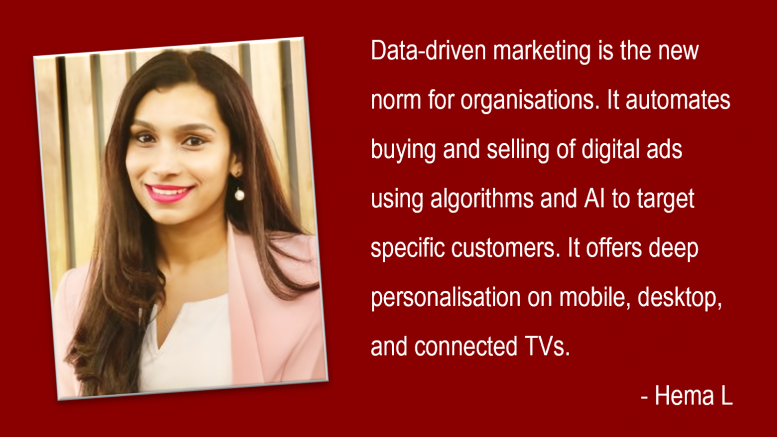Data is the new oil and it has been at marketers’ fingertips for a while now, transforming the way businesses interact with customers, driving retention and customer acquisition. The power of data is pivotal in consumer-facing industries like retail, revolutionising the way retailers approach marketing strategies.
Advanced analytics and AI-driven solutions are enabling retailers to make sense of the plethora of data gathered faster, to make informed and precise decisions that drive exceptional customer experiences, both in-store and online. A data-driven culture has the potential to dramatically improve retailers’ bottom line. If done right, the retail industry in India has potential to unlock ₹ 400 billion incremental EBITDA (earnings before income, tax, depreciation and amortisation) over next 5 years, according to Boston Consulting Group.
Indian retailers recognise this opportunity and are bullish on adopting data-driven approaches into their broader corporate strategies — and the biggest opportunity for long-term and short-term growth lies in data-backed marketing.
This begs the question: How can Indian retailers leverage data for better marketing?
Optimising omnichannel marketing
Customers today want the best of both worlds — online and offline. They expect businesses to cater to this demand, making omnichannel marketing an important aspect of any retailer’s overall brand strategy. Omnichannel marketing relies heavily on first-party data and deeper personalisation. And this data must be derived from both offline and online behaviour to better understand customer preferences to deliver powerful and memorable experiences. This is why 73% of Indian organisations relied on a blend of first-party (1P) and third-party (3P) data for marketing activities. And 78% of marketers in India witnessed an increase in marketing efficiency by leveraging data, a study conducted by Ernst & Young revealed.
The power of data in omnichannel marketing is manifold. Most importantly, it helps retailers understand their customers. Any retailer would know that there are many points where customers may decide to switch channels or stop spending altogether. However, as omnichannel customers spend more and purchase more often, it’s important to understand what they want and what makes these customers tick to craft targeted marketing strategies that drive more footfalls, increase retention and lead to new customer acquisition.
For instance, retailers can leverage AI-powered shelf sensors, self-checkout kiosks, and mobile apps to curate personalised offers. The data from these sensors can help retailers innovate in-store experience by improving product availability, streamlining checkout, and providing tailored recommendations to customers. And for the online wing, data can help retailers understand customer intent and sentiment, preferences, and understand their behaviours to make shopping more delightful and convenient. Such omnichannel strategies can ensure customers are aware of multiple distribution channels and help retailers stay relevant in their marketing messages as they rely on data to offer the right incentives that help sales and flow this back into their marketing mix.
Helps retailers be where their customer are
Data-driven marketing is the new norm for organisations. It automates buying and selling of digital ads using algorithms and AI to target specific customers. It offers deep personalisation on mobile, desktop, and connected TVs.
Data-driven marketing provides valuable customer insights, improves campaign performance and enhances brand visibility. It also helps marketers to explore hyper local growth campaigns to drive better ROI.
Improve your bottom line, increase growth
Retailers privy to the right consumer data can market products and services accurately and thus yield beneficial results, improving their bottom line. For instance, data-driven marketing strategies can change the way customers discover new brands in-store or online. With the advent of advanced digital signage, interactive displays, and personalised recommendations, retailers can craft immersive shopping experiences by leveraging technologies like AR/VR and mobile apps to showcase product information, reviews, and recommendations, and help customers make better purchase decisions. This is important because customers prefer to get such information directly from retailers rather than having to look it up online, a recent study by PwC revealed.
Data-backed marketing tools like google analytics, CRM solutions, content development calendars, and more help retailers ensure that the data percolates correctly. Investing in data-driven solutions eliminates friction and inconsistencies across channels as customer buying journeys are changing. A recent report by Deloitte revealed that, “consumers look for inspiration by exploring other consumers’ social media profiles, rather than expecting brands to inspire them through traditional advertising.”
Without data, it would become difficult for retailers to really listen to and inspire consumers. More importantly, data is pivotal in meeting marketing goals and establishing connections between sales, customer behaviours, and effective channel use. When assessing marketing goals, marketers can identify the overlaps between KPIs chosen and the data required to make better decisions. Using the right technologies can help them obtain key insights across touchpoints. For example, for a grocery retailer collecting customer data, the analysis could reveal that most of a target hyperlocal market purchases more organic produce. This information can inform marketing strategies like paid advertising regarding organic produce targeting customers in that hyperlocal area. These types of campaigns and narratives help retailers form meaningful connections with customers, driving more footfalls and improving the bottom line.
Data-backed marketing has to be an agile practice for retailers as it is constantly evolving and shifting due to the emergence of new technologies and changing consumer behaviour. Retail businesses need to take note of this if they want to fully leverage the power of data for effective marketing.
Research conducted by Mckinsey found data-driven organisations are 23 times more likely to acquire customers, six times more likely to retain them, and 19 times more likely to be profitable. The writing is on the wall: data-backed marketing is a necessity and can be a competitive differentiator in the crowded retail market where every organisation struggles to stay relevant. Retail organisations prioritising precision marketing can drive granular growth, achieve greater resilience and improve ROI.
The views and opinions published here belong to the author and do not necessarily reflect the views and opinions of the publisher.



Be the first to comment on "The power of data-driven marketing in India retail"